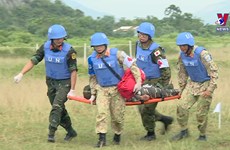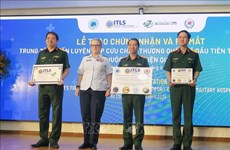Bac Giang residents hospitalised with abnomal bleeding
Nine people from northern Bac Giang province have been hospitalised due
to abnormal bleeding, possibly linked to poisonous chemicals.
Nine people from northern Bac Giang province have been hospitalised due
to abnormal bleeding, possibly linked to poisonous chemicals.
They were admitted to the National Institute of Hematology and Blood Transfusion, reported the Tien Phong (Vanguard) newspaper.
The first patient, a six-year-old girl from Tan Yen district, was sent to hospital at the end of October after her parents noticed that she had bleeding, including nosebleeds, which could not be controlled, said Ngo Hoa, from the institute.
The institute has also admitted a 51-year-old man from Lang Giang district, who suffered unstoppable gastric haemorrhaging for days. The patient was described as having contusions and his skin was crusted over.
After a period of treatment at the institute, the two patients were discharged in stable condition. However, officials became suspicious when both patients had a relapse within a short time.
"Some relatives of the six-year-old patient have suffered the blood clotting disorder, so we are considering toxic contact as the cause of the symptoms," said Hoa.
Sharing the same opinion, Prof. Nguyen Anh Tri, the institute director, said these patients possibly ate or came into contact with certain type of drugs or toxic materials.
"The substance resulted in the lack of essential elements which help patients to stop bleeding", he said, adding that the girl's mother suffered the same symptoms when she scratched her skin three months ago, while her father could not stop bleeding after being bit by a leech in June.
Tri also stressed that tests on all nine patients showed that they lack those factors essential for blood clotting.
They, therefore, were given vitamin K supplements to help their bodies to recover the ability to clot.
A team of experts from the National Institute of Hematology and Blood Transfusion, Health Ministry's Examination and Treatment Management Department, Poison Control Centre of Bach Mai Hospital, today will be dispatched to Bac Giang province to study the cause of the disease.
In addition to blood samples, the experts will carry out tests on samples of dirt and water from the areas the patients reside in.
Since November 2012, the National Institute of Hematology and Blood Transfusion has received some 20 patients suffering abnormal prolonged bleeding. Nine of them were from the same district of Tan Yen and were relatives of each other.
Results from the institute's study indicated that some of the nine patients had come in contact with insecticides and plant growth stimulants, while others used water from wells near an old insecticide warehouse.-VNA
They were admitted to the National Institute of Hematology and Blood Transfusion, reported the Tien Phong (Vanguard) newspaper.
The first patient, a six-year-old girl from Tan Yen district, was sent to hospital at the end of October after her parents noticed that she had bleeding, including nosebleeds, which could not be controlled, said Ngo Hoa, from the institute.
The institute has also admitted a 51-year-old man from Lang Giang district, who suffered unstoppable gastric haemorrhaging for days. The patient was described as having contusions and his skin was crusted over.
After a period of treatment at the institute, the two patients were discharged in stable condition. However, officials became suspicious when both patients had a relapse within a short time.
"Some relatives of the six-year-old patient have suffered the blood clotting disorder, so we are considering toxic contact as the cause of the symptoms," said Hoa.
Sharing the same opinion, Prof. Nguyen Anh Tri, the institute director, said these patients possibly ate or came into contact with certain type of drugs or toxic materials.
"The substance resulted in the lack of essential elements which help patients to stop bleeding", he said, adding that the girl's mother suffered the same symptoms when she scratched her skin three months ago, while her father could not stop bleeding after being bit by a leech in June.
Tri also stressed that tests on all nine patients showed that they lack those factors essential for blood clotting.
They, therefore, were given vitamin K supplements to help their bodies to recover the ability to clot.
A team of experts from the National Institute of Hematology and Blood Transfusion, Health Ministry's Examination and Treatment Management Department, Poison Control Centre of Bach Mai Hospital, today will be dispatched to Bac Giang province to study the cause of the disease.
In addition to blood samples, the experts will carry out tests on samples of dirt and water from the areas the patients reside in.
Since November 2012, the National Institute of Hematology and Blood Transfusion has received some 20 patients suffering abnormal prolonged bleeding. Nine of them were from the same district of Tan Yen and were relatives of each other.
Results from the institute's study indicated that some of the nine patients had come in contact with insecticides and plant growth stimulants, while others used water from wells near an old insecticide warehouse.-VNA













